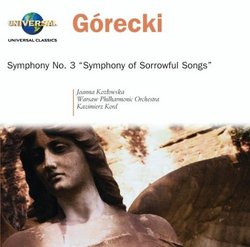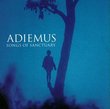| All Artists: Henryk Gorecki, Kazimierz Kord, Warsaw Philharmonic Chamber Orchestra, Joanna Kozlowska Title: Górecki: Symphony No. 3 "Symphony of Sorrowful Songs" Members Wishing: 0 Total Copies: 0 Label: Deutsche Grammophon Release Date: 4/13/2004 Genre: Classical Styles: Historical Periods, Modern, 20th, & 21st Century, Symphonies Number of Discs: 1 SwapaCD Credits: 1 UPC: 028947618201 |
Search - Henryk Gorecki, Kazimierz Kord, Warsaw Philharmonic Chamber Orchestra :: Górecki: Symphony No. 3 "Symphony of Sorrowful Songs"
 | Henryk Gorecki, Kazimierz Kord, Warsaw Philharmonic Chamber Orchestra Górecki: Symphony No. 3 "Symphony of Sorrowful Songs" Genre: Classical
|
Larger Image |
CD DetailsSimilarly Requested CDs
|
CD ReviewsGorecki's Beautiful, Sorrowful Masterpiece Superbly Performe Michael Bradley | 08/02/2009 (5 out of 5 stars) "Written by Henryk Gorecki in 1976 while the Soviet Union was still occupying Poland, the Symphony No. 3 "Symphony of Sorrowful Songs" is a beautiful, sorrowful masterpiece that powerfully communicates the enduring Christian faith of Catholics in Poland who survived five years of brutal German Nazi rule and later four decades of brutal Soviet occupation of their country. He dedicated the symphony to his wife.
Conductor Kazimierz Kord and the Warsaw Philharmonic Orchestra recorded this excellent performance of the "Symphony of Sorrowful Songs" in 1994 with Polish Soprano Joanna Kozlowska. Kozlowska's emotive clear voice evokes the suffering communicated by the three different prayers upon which each of the three movements of the symphony are based. This CD is priced low, but the quality of the recording is excellent. Of the three recordings of this symphony that I have listened to so far, this is by far the best because the Warsaw Philharmonic and Kozlowska perform so harmoniously together. The 30 minute first movement is centered on a 15th-century lament from the Holy Cross Monastery in Poland in which Jesus' mother speaks to her suffering son. You might be tempted to turn up the volume at first because the lush string chords build very slowly in intensity until the lamentation prayer is beautifully sung. Then the intensity slowly and gently decreases. The timing and the pitch of both Kozlowska and the orchestra are superb. The very poignant second movement (10 minutes) is based on a prayer to the Virgin Mary that was scratched into the wall of a Gestapo cell by an 18-year-old girl being held prisoner by the Nazis the city of Zakopane. Kozlowska's voice and orchestra blend harmoniously together to convey the emotion intensity of the prayer. The final 19-minute movement is based on a Polish folk song-prayer that tells the story of a suffering mother who is searching for her lost son who she fears has been killed by enemies and buried somewhere in an unknown place. She prays that God will console her son, wherever he is. Gorecki's prayer-like music is captivating and conveys his deep spirituality. Anybody who is aquainted with suffering will be able to relate to this sometimes heart-wrenching music. It is an emotionally intense experience but well worthwhile. If people around the world listen to Gorecki's music they may be able to better appreciate the suffering experienced by Christians, Jews, and other people in Poland during the past century. Perhaps his music will encourage people to work harder to alleviate the suffering of people living in our world today. " |

 Track Listings (3) - Disc #1
Track Listings (3) - Disc #1








